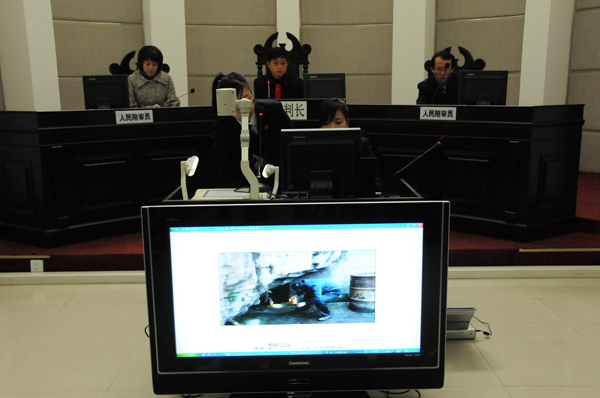A bumpy road for environmental courts
Updated: 2013-10-30 23:15
By Hu Yongqi in Kunming and Wu Wencong in Beijing (China Daily)
|
|||||||||||
Bureaucracy and lack of public initiative blocking protection efforts
 |
|
Plaintiffs present evidence of sewer pollution for an environmental protection court in Guiyang in 2010. Qi Jian / Xinhua |
In April, toxic pollutants were dumped in the Xiao-jiang River by three companies in the Dongchuan district of Kunming, capital of Yunnan province.
The river turned milky in appearance and the incident aroused public anger around the country.
Wang Xianghong, presiding judge of the environmental protection court under the Kunming Intermediate People's Court, was summoned to collect evidence from 10 sections of the river. On the way there she suffered a broken ankle but didn't have time to rest. Eight people were arrested and the case will be heard at her court within days.
"Being called out like that is typical. We have to confirm the situation at the scene for hearings and trials," Wang said.
"Apart from that, we also have to spend a lot of time on national environment protection legislation using the knowledge we have gained from our everyday work.''
The environmental protection court, founded in December 2008, followed those established in Wuxi, Jiangsu province, and Guiyang, Guizhou province, in 2007, Wang said.
The number of pollution cases has shown an annual growth rate of more than 20 percent since 1996, Sun Youhai, head of the China Institute of Applied Jurisprudence of the Supreme People's Court, said in an interview in July.
More than 70 environmental courts have been established nationwide.
With just six employees, the court in Kunming has accepted and heard 106 cases, involving pollution and other ecological damage since its establishment, including six public-interest cases.
During the same period, five environmental protection courts that were set up at the county level in Kunming after the establishment of Wang's court heard 330 cases, 90 percent of which resulted in jail sentences, according to the court's report.
In 2008, the local authorities were determined to tackle pollution in two rivers and a lake in Kunming. The arsenic pollution in Yangzonghai Lake, in Yiliang county, triggered the establishment of the environmental protection courts, said Wang.
"As the economy developed, the environment was also contaminated. However, environmental protection was not been given enough attention. Courts were assisting the government to handle most pollution cases before our institution was established," Wang said.
"The administrative punishment for contamination was just a fine of 200,000 yuan ($34,000) to 500,000 yuan at most. So companies would keep polluting. The fine was a small percentage of their earnings.''
In a survey by Kunming Times earlier this year, 70 percent of local residents had no idea of the court and its responsibilities. In the first two years, the environmental protection court had very few cases to handle.
The situation has improved since 2011 when the court heard a famous case. The environmental protection bureau of Kunming sued two companies for contaminating water in Songming county.
It was the first time ever in the country that the environmental protection authority filed such a lawsuit.
Wang's court ruled that the polluters should pay 4.17 million yuan to remedy the damages. The case was chosen by the Supreme Court among the top 10 cases in 2011. In 2012, the court heard more than 30 cases and the number has increased to 38 so far this year, said Wang.
"In Kunming, pollution cases should go through environmental protection authorities first, and then to the police who will collect evidence and submit it to us if the government sues the polluters," said Wang.
"That is the reason for the small number of cases in our court."
Even in some places, major companies are friends with local environmental protection officials who do not want to take the polluters to court. Wang said the awareness of environmental protection authorities should be raised. Usually, most pollution cases are processed by the environmental protection bureaus.
"Our fundamental rule is that there must a be a legal suitor, or we will not take the case.''
The Civil Procedure Law stipulates that the suitors for environmental issues must be governmental organs and legal environmental protection organizations.
"Even though we prefer governmental departments to be the suitors due to their capacity to collect data, more organizations and people should be involved to broaden the scale for public-interest litigation. That's the way to encourage people to use judicial channels," said Wang.
Collecting evidence is another headache for Wang and her colleagues. Pollution cases require exact data that is obtained from scientific detection to support the accusation, but most individuals are unable to do it because of the high cost, said Wang.
Wang said the public are too tolerant toward pollution. In the past five years, no community has sued polluters.
Due to the difficulties of investigating pollution, public-interest litigation seems more crucial in anti-pollution efforts. However, the provision that litigation subjects must be those cited by laws in the new Civil Law means the environmental NGOs face many obstacles.
Ma Yong, director of the supervision and litigation department at the environmental legal service center of the All-China Environmental Federation, and his colleagues, have successfully brought eight environmental public interest cases to environmental courts before Jan 1 when the new provisions were introduced.
But the six civil environmental public interest cases they tried to litigate this year have all been rejected or ignored.
"We thought the new General Provisions of the Civil Law may make our work easier, so we deliberately chose four normal courts rather than environmental courts this year," said Ma. "To our surprise, we were not only ignored by the four courts, receiving no written replies after we submitted the indictments, even the environmental court in Hainan province refused to accept our cases."
Ma said no other organizations have tried to submit indictments regarding environmental public-interest cases this year. The presiding judge of Haikou Environmental Protection Court didn't respond to questions from China Daily.
For Wang of the Kunming court, her attitude seemed unchanged. "No matter what happens, our door is always open to anyone who would like to contribute to environmental protection," she said.
Contact the writers at huyongqi@chinadaily.com.cn and wuwencong@chinadaily.com.cn
Guo Anfei contributed to the story.
Today's Top News
Visa influences Chinese tourists
China's population policy unchanged
Hukou system lags behind urbanization
Authorities deny changes to one-child policy
China-EU e-gov't forum to boost efficiency
Spike in divorces linked to tax loophole
Spy scandal 'will weaken' US global credibility
Economies seek climate change aid
Hot Topics
Lunar probe , China growth forecasts, Emission rules get tougher, China seen through 'colored lens', International board,
Editor's Picks

|

|

|

|

|

|





